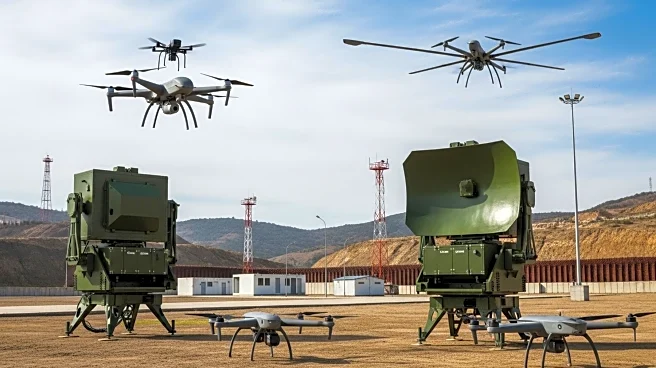What is the story about?
What's Happening?
Ukraine is intensifying efforts to improve its interceptor drone capabilities in response to ongoing Russian aerial attacks. Oleksandr Syrskyi, Ukraine's top commander, announced the creation of a layered defense system to counteract Russian Shahed and Geran drones. This initiative involves training more crews and interceptor operators, as well as equipping them with advanced weapons and radars. The Ukrainian air force reported successfully downing 430 of 502 drones and 21 of 24 missiles launched by Russia overnight. The move comes amid heightened tensions, with a recent Russian rocket attack killing two mine-clearing workers from a Danish humanitarian group near Chernihiv.
Why It's Important?
The enhancement of Ukraine's drone interception capabilities is crucial for maintaining national security and protecting civilian lives. As Russia continues to employ drones in its military strategy, Ukraine's ability to effectively counter these threats is vital for its defense. The success of these efforts could influence the broader dynamics of the conflict, potentially deterring further Russian aerial assaults. Additionally, the international community's response, including security guarantees from 26 countries, underscores the geopolitical significance of the conflict and the global commitment to Ukraine's postwar security.
What's Next?
Ukraine's focus on improving drone interception is likely to continue, with further training and technological advancements expected. The international coalition's commitment to providing security guarantees may lead to increased military support and strategic partnerships. As the conflict persists, both sides may escalate their use of drone technology, prompting further developments in defense systems. The situation remains fluid, with potential diplomatic and military responses from major stakeholders shaping the future course of the conflict.
Beyond the Headlines
The use of drones in warfare raises ethical and legal questions regarding civilian safety and the militarization of technology. The conflict's impact on humanitarian efforts, as seen in the attack on mine-clearing workers, highlights the challenges faced by non-combatants in war zones. Long-term implications may include shifts in international defense policies and the development of new technologies to counter drone threats.
















